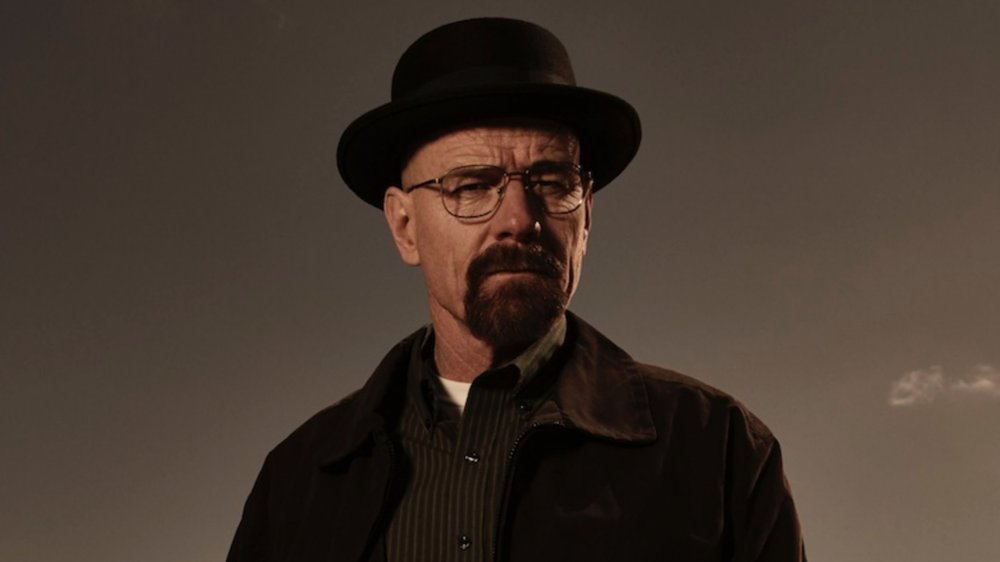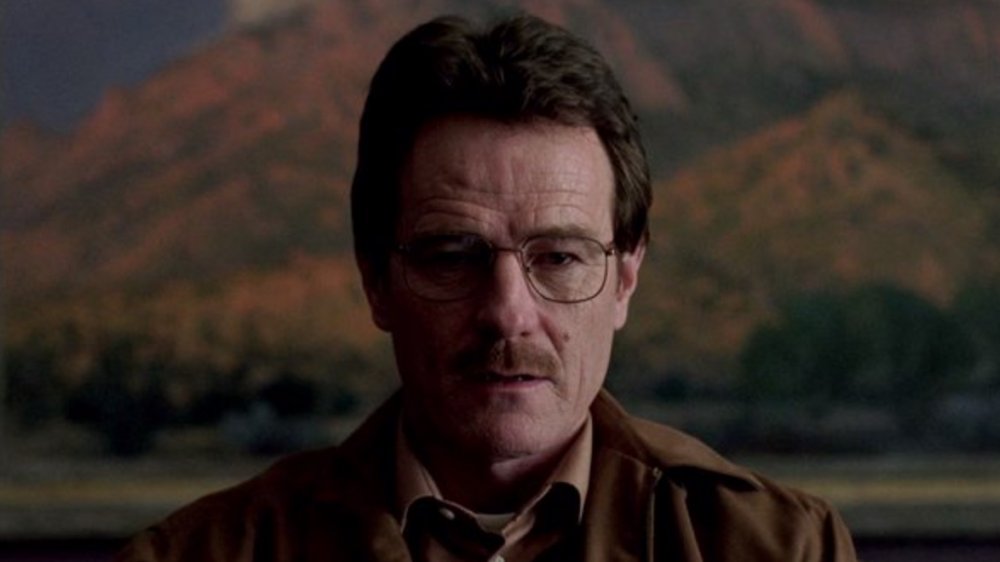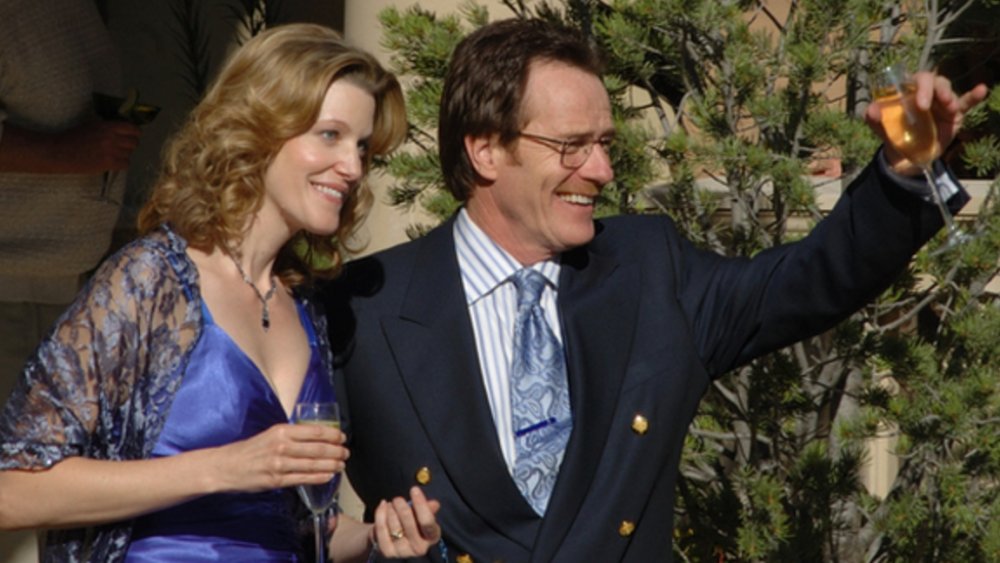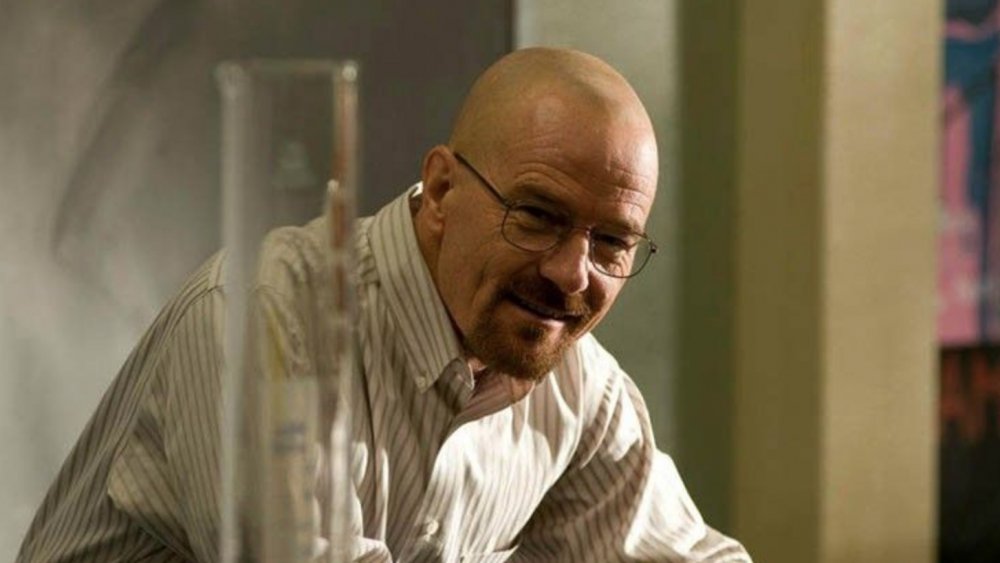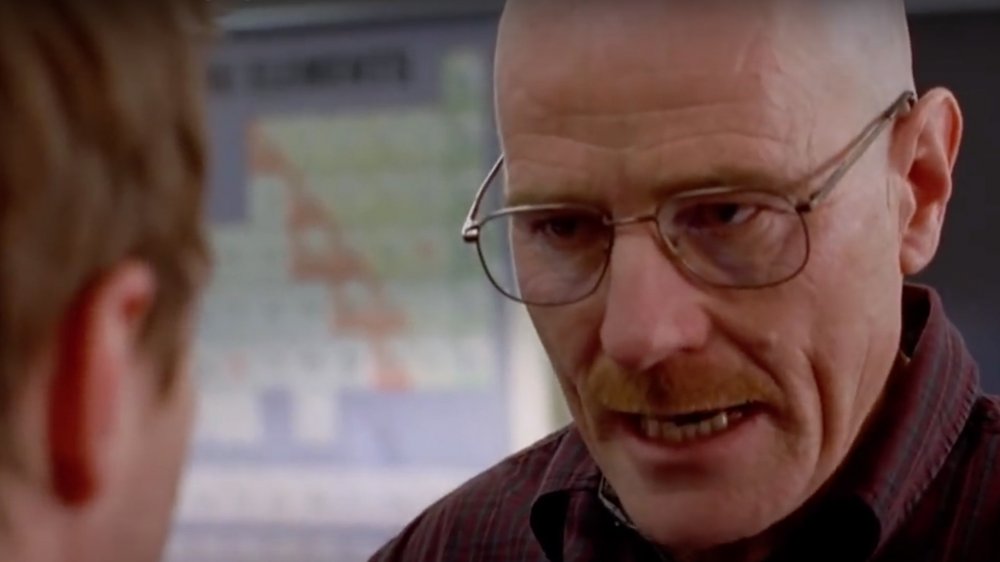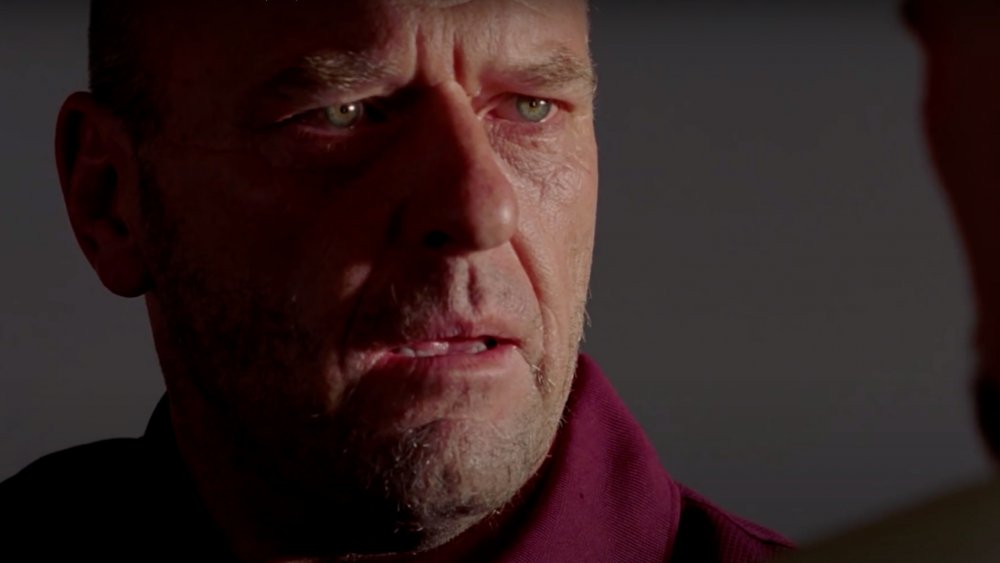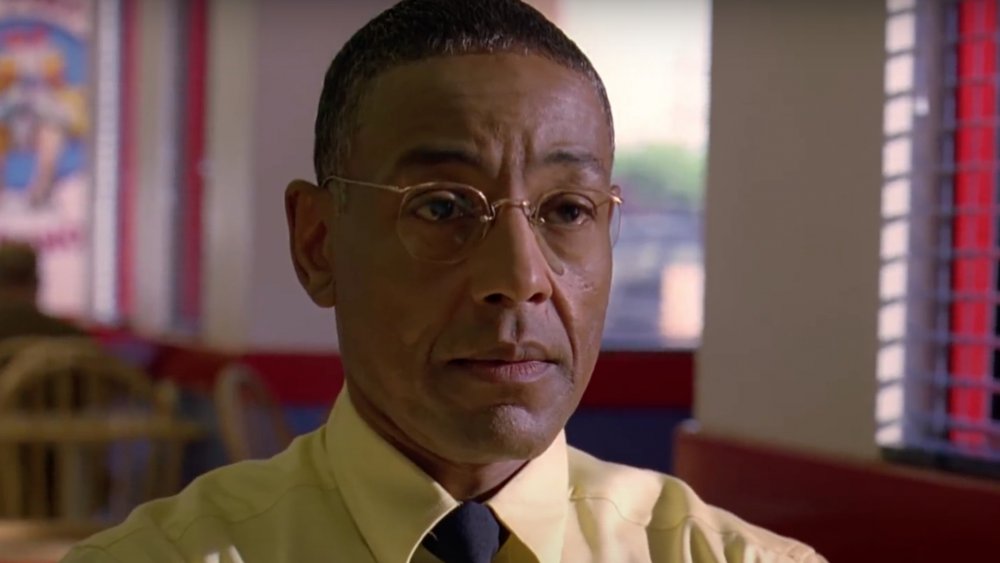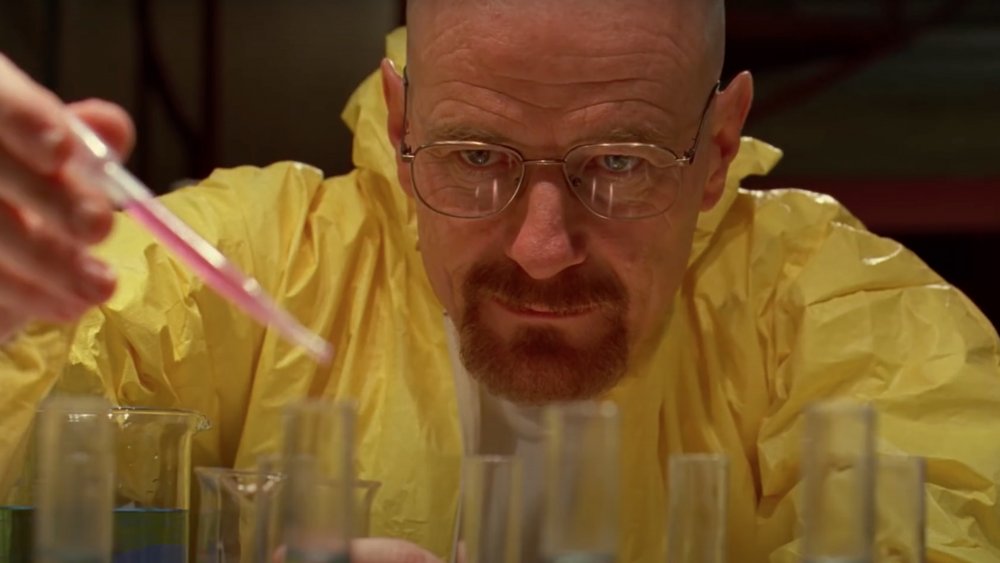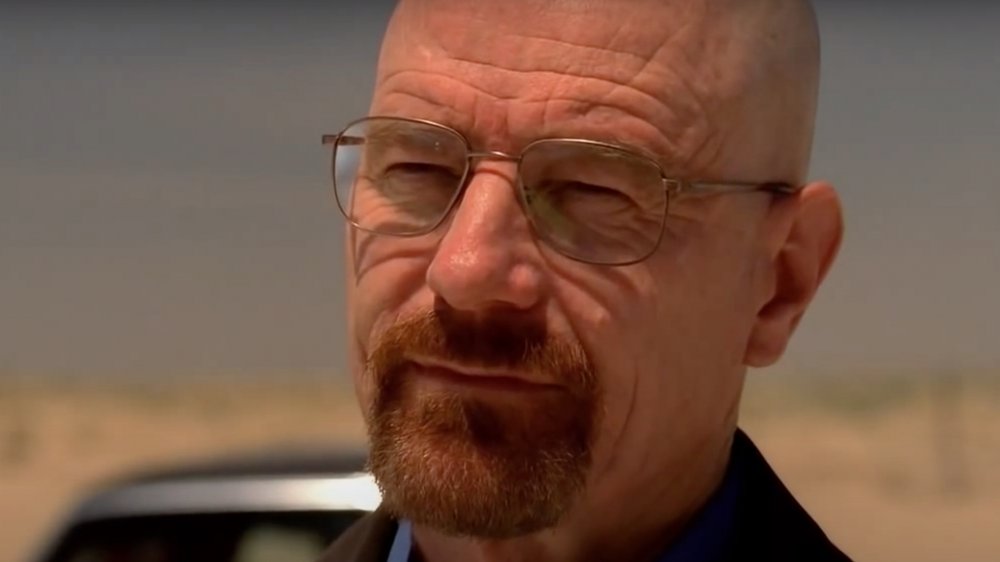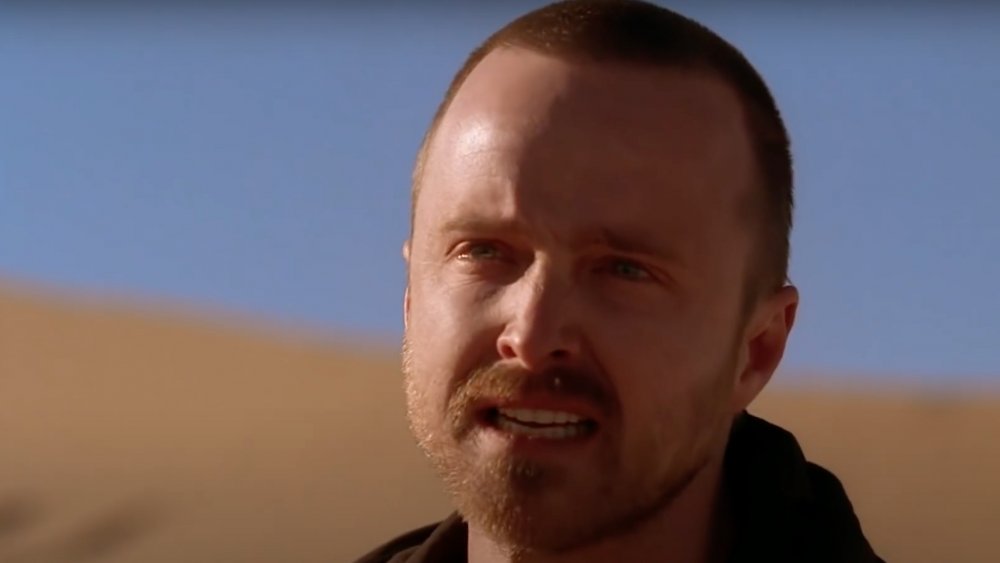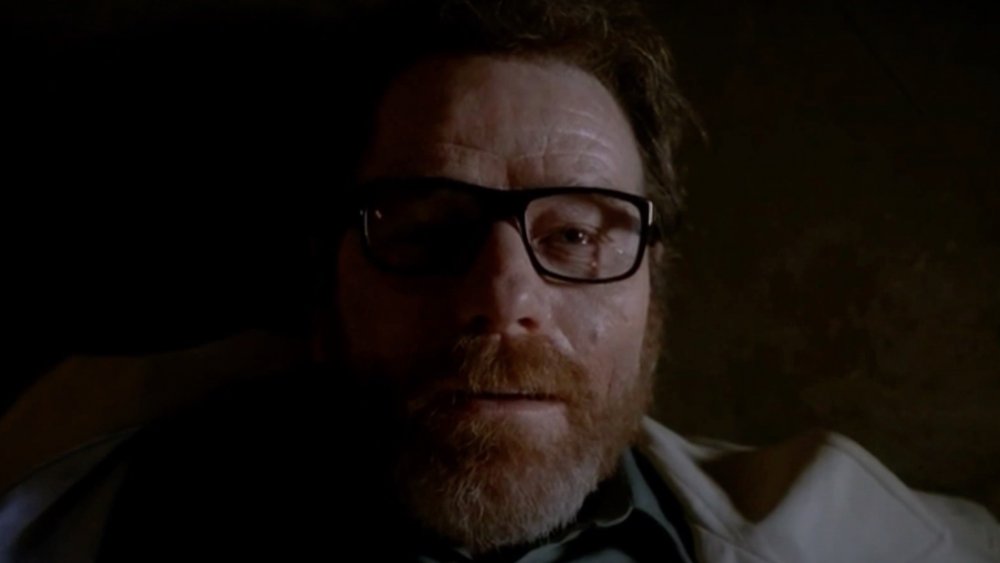The Real Reason Walter White Had To Die In Breaking Bad
Breaking Bad features an intriguing plot right from the start: A high school chemistry teacher finds out he has terminal cancer, and, to secure his family's finances, resorts to cooking meth. What follows is a long, complex slide into darkness, domination, and deceit.
The Walt we first meet is dorky, somewhat comical, and seems to have the best interests of his family at heart. The first episode follows him as he goes about his mundane life. A couple years later, we find ourselves staring into the eyes of a man we hardly recognize, despite having been with him every step of the way. As we watch Walter White bleed out on the floor of a meth lab in the series finale, it's hard not to wonder if things could have gone differently. The creators of Breaking Bad had shown an incredible amount of ingenuity in getting our protagonist to this point — surely, there had to be another route, in which Walter gets a somewhat happier ending? But that's just wishful thinking. Walter White, and the show he stars in, were always headed down a path with just one ending ... and this is why.
The Walter White of yore
The Walter White we first meet is a product of circumstance. He learns of his inevitable demise via lung cancer and seeks out a solution to his family's financial problems. Once his death clock begins ticking, Walt makes all his choices out of fear and panic. The tighty-whitey clad antihero can't even face the consequences of his actions in the very first episode. As sirens are closing in on his mobile meth lab in the desert, he impulsively puts a gun to his head and pulls the trigger. Luckily, the gun misfires with a dead click.
A lot of the choices Walt makes are reactions to his extraordinary circumstances – but they are choices he makes nonetheless. The choice that gets him into this whole mess is made without any immediate anxiety, though. When Walt confronts former student Jesse Pinkman in his driveway and forces him to start cooking meth with him, it is the beginning of a very large snowball. It is also the first taste Walter White gets of his own addiction.
Grand plans for the future
As it turns out, the humble chemistry teacher once had grandiose dreams for the future. Years prior to the pilot, Walt helped found a company called Gray Matter Technologies and was the mind behind a lot of the research that transformed the tech company into a giant valued in the billions. He didn't get rich off his work, however — he walked away with about $5,000. Fast forward several years into the future and he is stuck teaching bored teenagers basic chemistry and working at a car wash in the evenings.
Walt feels powerless against an indifferent world, one that chewed him up and spat him out among pretty, polished lives panning out far better than his. His cancer diagnosis wakes his desire for more and makes him aware of how numb he has become. Amid the fear of death, looking back at his life and how he'd been ripped off added a heaping scoop of anger to his simmering resentment. The remedy he chooses to combat all this is power. It becomes an addiction he never overcomes.
He's addicted to much more than science
Walter White loves chemistry. Cooking methamphetamine re-ignites a love for science that had slowly been sapped out of him through years of teaching. But as much as he loves the scientific process, he begins to love its products more — especially attention and praise. While much of the work he did in his youth was great, he never got the recognition from it that he craved. In the world of meth, in contrast, people sing his praises continuously.
His ego is inflated by the fact that the chemistry involved is easy for him. He always keeps his pride saturated in self-righteousness, claiming this is all for his family, but the fact remains that he is proud of his product. In the end, it's all about him.
For the first time in his life, Walt makes his own choices. This is made quite apparent in season one's "Gray Matter," in which he is confronted by his family about seeking cancer treatment. His vocal proclamation about wanting to go out on his own terms reinforces all the choices he has made so far and strengthens his resolve moving forward. The physical manifestations of the cancer result in Walter pushing back against his demise and becoming bolder in his dive into the meth world.
Power overwhelming
Throughout the show, we constantly hear Walt preaching that everything he does is for his family. We hear it so much that we share in Skyler's disgust in that fateful statement by the time the final season comes, rolling our eyes right alongside her. This pseudo-noble raison d'etre becomes empty long before Walt has the self-awareness to realize it.
As Walt becomes more absorbed in his own selfish pursuit of power, his loved ones begin to suffer around him. The ripples extend out from him and destroy lives all around him. He even manages to ruin the lives of the corrupt individuals around him. The man is a wrecking ball.
Even though Walt is smart and logical, he lacks insight into the psychological rationale behind what he is doing. This makes for a dangerous combination. As he makes his dire choices, he blinds himself to the truth of his actions and ensures his final fate.
His consequences affect more than just himself
Despite the chaos that surrounds him, Walt is able to approach situations analytically and come out on top. However, Walt begins to emulate the powerful individuals around him. In their world, power is maintained through fear. Choices that he makes begin to show that he is not the kind, helpless man we first thought he was. His decisions begin to severely affect the lives of those around him, displayed in a destructive manner by the airplane crash over Albuquerque.
This plane crash, which plops a symbolically-loaded charred teddy bear into Walt's pool, is a direct result of his decision to stand by and watch Jesse's girlfriend choke to death in a heroin overdose. Up until this point, most of the choices he's made are to save his own life. Now, his decisions are made in an attempt to maintain control.
It'd be nice to think that every decision Walt makes is to survive in an incredibly dangerous, drug-fueled world. But in reality, there's always been another route for him — an option that could have avoided all the turmoil he endures. It's an escape from the world of drugs most meth kingpins could only dream of. And he drinks beer with him on the weekends.
The right choice is beside him the whole way
In the case of a lot of criminals in Breaking Bad, you can understand the trap they have fallen into. These people need to continue down their path in order to survive, having no other route available to them. They have a choice between death or a lifetime in prison — no choice at all, in practical terms.
Walter White, however, constantly has a way to get out of the predicament in which he has landed himself. Hank Schrader, the incorruptible DEA agent, is always in the mix as his lovable brother-in-law. The more we see from Hank the more we know that given the circumstances and their relationship, Walt could pull the rip-cord at any time.
Hank is an important aspect of the show's dynamic. He shows that the possibility of virtue is alongside Walt the entire way. He chooses to actively ignore that choice. Hank's death displays that choice being removed from the equation — redemption, at that point, is no longer an option.
The fight for power
Walt's pursuits are hindered by the drug kingpin known as Gus Fring. The man is smart and has years of experience in a world to which Walt is a newbie. Rather than seeing a moment to profit and continue doing what he loves through a mutually beneficial relationship, Walt only sees competition in Gus.
This is another display of his ego running rampant. The drug operations that run behind the scenes of Los Pollos Hermanos, the restaurant chain Fring owns, are a streamlined operation run by level-headed individuals. Walt, however, hates not being in control. Moreover, due to Gus' stoic nature and Walter's being sequestered in an underground lab, working with Gus means being deprived of the praise over his product that he's enjoyed.
Add to all this the fact that his power over Jesse is removed: Gus sees Jesse as an unstable factor that does not need to exist in the equation. Walt refuses to accept this because it would remove what little control he has. Like the master of logic that he is though, he masks this all in a thick cloud of supposed loyalty. The end result shows that there is no one whose life can't be destroyed by Walter White.
It was the best of times
By the halfway point of the series, it is beginning to become apparent that we may not be rooting for the good guy. Walt continues to be offered routes with positive outcomes for most parties involved. He does not choose them.
Walt does not see these other routes presented to him as viable for the simple reason that he himself did not think of them. He has become a powder keg of emotions. His ego will not let him see any situation as a win if there isn't somebody else losing. Having spent a lifetime devoid of any control, the idea of losing any power is only seen as a loss entire.
In the best option offered him, Walt brings in vast quantities of money making meth, Jesse is stable, and Walt's family situation is secure. They own their own business — a business which launders money he makes by implementing the scientific methods he loves. However, in this scenario, Walt is not in control of everything like he was before. When Walt isn't in control, he gets scared. When Walt is scared, he acts irrationally and violently.
I am the one who knocks
Walt's skills make him a valuable asset to every drug dealer he works with. His product is unrivaled in its quality, which gives him the ability to pull the strings from time to time. Aside from production, though, he is not capable of running any other aspect of drug dealing. This does nothing to stop him from burning down the bridges that allow him to work.
Every time we feel as though Walt has crossed that final line, he shows that he can push it even further. In a climactic moment, Walt lures Gus to a nursing home and detonates a bomb that kills him. In killing Gus, he ascends to a new level of recklessness. Not only does Walt set off a bomb in a nursing home — he destroys any protection provided by Gus and places himself at a top position that he does not have the skills to fill.
The brazen attack on Gus shows a loss of the foresight and caution that once characterized the doomed chemistry teacher. His ignorance leaves him blind to the mistakes of his past. Whenever a drug dealer was eliminated before, another one stepped into their place. This is exactly what happens again, only this time, it is a much more ruthless pack of individuals who don't display any logic Walt can reason with. And he brings them on himself.
Breaking good
Once we reach the series finale, every person who has had any relation to Walter White is either dead or dealing with a life in shambles. Whether they are buried in the desert or chained in a basement cooking meth for the Aryan Brotherhood, they're in dire straights. Due to circumstances he created, Walt is forced into isolation at a cabin in New Hampshire, allowing for a much-needed moment of introspection.
During his time alone, Walt finally gains some clarity. He realizes that any feeling of control he's had is just him thrashing around in the midst of chaos. The first moment of redemption for Walt comes in the silencing of his enormous ego and the pride that has ruled him for so long. It is the death of every aspect of who he is that fuels Breaking Bad's immortal ending.
In his final moments, there are bursts of honesty and selflessness that allow those around him to finally achieve some semblance of happiness. Especially Jesse, who shines through as the emotional center of morality, when, under normal circumstances, he is easy to brush off as a loser. The entire show presents a set of scenarios that turn concepts of good and bad on their heads. We get to see the dark consequences of breaking bad play out alongside the emotional torment involved in breaking good.
The death that needed to happen
Had Walt not marched to his death, he would have continued fighting for every ounce of power he could get. His family would have continued suffering — instead, they are able to achieve some piece in the wake of Walt's death. Law enforcement has his body, no one needs to be further harassed. This also ensures few questions as to his kids' trust fund.
Walt's death is not only necessary for the happiness of all those around him but for himself as well. He had no control for so long in his life, with the threat of cancer taking away that final choice acting as an ultimate cruelty. By bleeding out from a gunshot wound surrounded by lab equipment, he is able to go out on his own terms. Another layer of absolution is added by Walt not even receiving the death he wants. Jesse's refusal to shoot Walt rips control away from him, and displays the tortured addict's own achievement of freedom. In the end, Breaking Bad is about freedom, control, and power — albeit, in ways no one, not even the protagonist, could have planned for.
